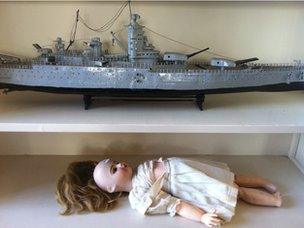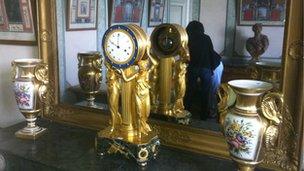French ex-president Giscard d'Estaing auctions goods
- Published
Auctioneer Claude Aguttes describes some of the items up for sale
A blustery autumn day in central France - and a small crowd has gathered in front of an imposing, cream-coloured building in the village of Chanonat, a few miles outside Clermont-Ferrand.
It's a mini-chateau, complete with turrets and a formal garden. A wall screens it from the road.
In a novel set a hundred years ago, it would be the kind of place to find a prosperous family from the provincial haute bourgeoisie, or maybe some forgotten son of the nobility, poring over his objets d'art.
Fitting, therefore, to learn that for most of his life, this has been the home of Valery Giscard d'Estaing - France's most cultivated, and most aristocratic, of recent presidents.
The crowds are here because the chateau de Varvasse is up for sale. The contents are auctioned on Saturday.
Here are seasoned hunters of rare Empire furniture, gouty antique dealers from Paris' Left Bank, collectors of porcelain and books and 19th Century clocks.
But also here are locals. Neighbours of the Giscard d'Estaings going back eight decades; knobbly-faced Auvergnat farmers and their wives, and the curious.
For such people as these, the pre-sale open day is not just a chance to eye up a possible bargain. It's also a once-in-a-lifetime glimpse of the private life of a president.
'Feeling of grandeur'
"Back in the days when he was head of state, the cars used to slow down outside the gates as a mark of respect," says one neighbour.
"It gave the village a feeling of grandeur which we never forgot."

Only a few objects up for auction hint at the private world of the Giscard d'Estaings
Now aged 86, Mr Giscard d'Estaing is selling off this family home because he has found another one.
A few years ago he acquired the chateau d'Estaing in the neighbouring department of the Aveyron, and he has gradually been moving in.
His aim is to create a foundation at his new chateau, one to perpetuate his name and remind the world of his achievements.
But to complete this task, he needs money. Hence the auction, and a hoped-for 400,000 euros (£319,000; $515,000) in proceeds.
To be truthful, much of what is for sale is of mediocre artistic interest.
The chateau was acquired in 1933 by Mr Giscard d'Estaing's father, who did it up in highly conventional style.
The most precious items have been kept by the family, so what is left is fairly standard country-house fare.
Kissinger, Kohl and Sarkozy
There are exceptions. A Sleeping Ariadne by the 18th Century sculptor Pierre Julien is expected to raise 30,000 euros (£23.8k, $38.5k). An exact replica by the same artist can be seen at Versailles.
A bronze clock by Lepaute, held aloft by two gold-leafed vestal virgins, decorates the mantelpiece in the Charles X drawing room. It should get 15,000 euros (£12k; $19.2k).
The other 400 or so lots include tables, chairs, wall-paper prints, paintings, pottery, as well as curios and knickknacks. Most of it is from the early- and mid-19th Century.

Some of the lots are expected to fetch thousands of euros
The Giscard d'Estaings have removed every personal trace. No picture of the ex-president, his wife and four children can be seen.
The only exceptions are an antique child's doll, a train-set, and a model battleship.
"It may look like a typical prosperous country house, but of course what is different is that this one belonged to a president," says Claude Aguttes, who is conducting the auction.
"Henry Kissinger sat on one of these sofas. Helmut Kohl was here, Nicolas Sarkozy. There were moments of crisis and moments of hope.
"International decisions were made over the telephone. It is all part of the spirit of the place."
Fans and detractors
For Mr Aguttes, there is no question that the Giscard name carries a certain mystique.
At 48 in 1974, he became the third president of the Fifth Republic in elections that followed the death while in office of President Georges Pompidou.
He was praised as a moderniser and a liberaliser. Abortion was legalised, and technology championed.
But in 1981 he lost to a leftward surge in the electorate, as Francois Mitterrand swept to power.
He became president of the Auvergne regional council, and in the early 2000s helped draw up the proposed European constitution.
But Giscard d'Estaing always had his detractors too. He was seen as impossibly pompous - lofty not just in inches, but in manner too.
The aristocratic d'Estaing - it was pointed out - was not aristocratic at all. The name had been added late to the Giscard, raising accusations of social climbing.
But Mr Aguttes will have none of it.
"No politician ever has 100% support, so of course he has his enemies. But Giscard is an immensely cultivated, polished, persuasive man.
"And he still has many fans in this country. Just look around you. Would all these people be here, if he wasn't a great man?"
- Published8 May 2012